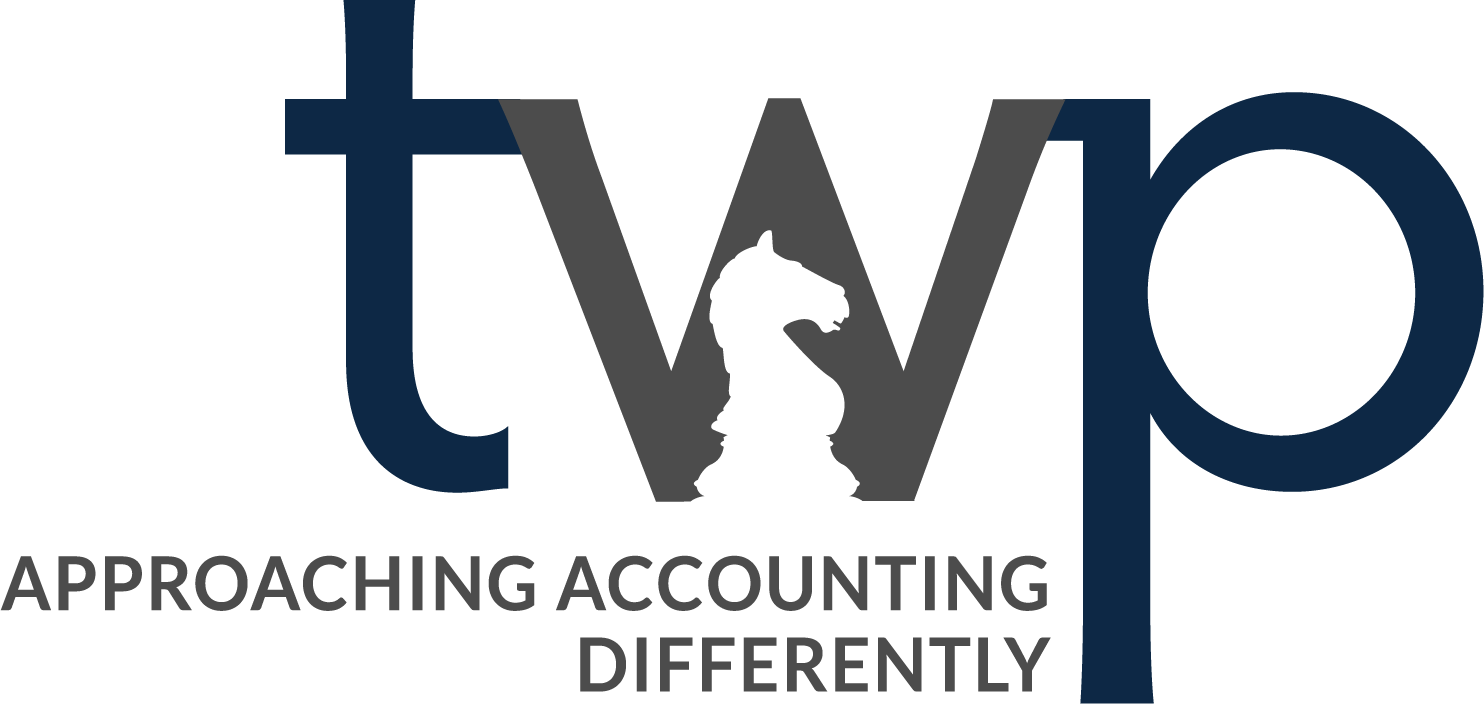TWP Tax Tips
Owe the IRS Money? Here’s How to Pay
If you owe federal taxes, you may be required to pay by the April deadline. Remember, if you get an extension to file your taxes, payment is still due by the April deadline. You can set up a payment plan if you can’t pay the full amount you owe now.
Here are some choices for making your payment:
Use Direct Pay: Internal Revenue Service (IRS) Direct Pay is a free and secure way to pay directly from your checking or savings account.
Pay by Debit or Credit Card: If you don’t want to link a bank account, you can use your credit or debit card. Remember that you’ll have to pay a processing fee and may incur interest charges.
Pay When You E-File: If you file your federal tax return electronically, you can pay directly from your bank account using Electronic Funds Withdrawal.
This information is not a substitute for individualized tax advice. Please discuss your specific tax issues with a qualified tax professional.
Source: IRS.gov, May 29, 2025
Know and Understand Your Correct Filing Status
Taxpayers should understand their filing status well and at least be familiar with the other choices.
When preparing and filing a tax return, the filing status affects:
If the taxpayer is required to file a federal tax return
Their standard deduction amount
If they can claim certain credits
The amount of tax they should pay
Here are the five filing statuses:
Single: This status is normally for taxpayers who are unmarried, divorced, or legally separated under a divorce or separate maintenance decree governed by state law.
Married filing jointly: If a taxpayer is married, they can file a joint tax return with their spouse. When a spouse passes away, the widowed spouse can usually file a joint return for that year.
Married filing separately: Married couples can choose to file separate tax returns in certain circumstances.
Head of household: Unmarried taxpayers may be able to file using this status, but special rules apply.
Qualifying widow(er) with dependent child: This status may apply to a taxpayer if their spouse died during one of the previous two years and they have a dependent child. Other conditions also apply.
This information is not a substitute for individualized tax advice. Please discuss your specific tax issues with a qualified tax professional.
Source: IRS.gov, July 8, 2025
Do You Know the Difference Between Taxable and Nontaxable Income?
All income you receive is taxable unless the rules explicitly state it isn’t. According to the Internal Revenue Service (IRS), taxable income includes earned income, such as wages, as well as income from providing services or exchanging property or services. Rental income, interest, dividends, and social security benefits are all examples of taxable unearned income.
Some income is only taxable if certain conditions are met. For example, life insurance proceeds are usually not taxable to the beneficiary unless you redeem a life insurance policy for cash. Any amount you receive above the cost of the policy is taxable. State and local income tax refunds may be taxable and should be reported on your federal taxes.
Some forms of income are usually not taxable, like:
Gifts and inheritances. (State taxes may apply to inheritances.)
Welfare benefits.
Damage awards for physical injury or sickness.
Cash rebates from a dealer or manufacturer for an item you buy.
Reimbursements for qualified adoption expenses.
Several factors will affect the cost and availability of life insurance, including age, health, and the type and amount of insurance purchased. Life insurance policies have expenses, including mortality and other charges. If a policy is surrendered prematurely, the policyholder may also incur surrender charges and face income tax implications. You should consider whether you are insurable before implementing a life insurance strategy. Any guarantees associated with a policy depend on the issuing insurance company's ability to continue making claim payments.
This information is not a substitute for individualized tax advice. Please discuss your specific tax issues with a qualified tax professional.
Source: IRS.gov, August 18, 2025
Taking a Side Gig? Here’s How It May Affect Your Taxes
Taxpayers who work in the gig economy may benefit from having a better understanding of how their work affects their taxes.
People involved in the gig economy earn income as freelancers, independent workers, or employees. They use technology to provide goods or services, including renting out a home or spare bedroom and giving car rides.
Here are some things taxpayers should know about the gig economy and taxes:
Money earned through this work may be taxable
There are tax implications for both the company providing the platform and the individual performing the services
This income may be taxable even if the indivudual taxpayer doesn't receive a Form 1099-MISC, Form 1099-K, or Form W-2. This income may also be taxable if the activity is only part-time, side work, or if you’re paid in cash.
This information is not a substitute for individualized tax advice. Please discuss your specific tax issues with a qualified tax professional.
Source: IRS.gov, July 8, 2025
Need Last Year’s Tax Returns?
Help is available for taxpayers who need tax information for prior years but who did not keep copies of their returns. There are ways to get the information you need.
Keep in mind the Internal Revenue Service (IRS) recommends that taxpayers keep copies of their returns and any documentation for at least three years after filing:
Ask your software provider or tax preparer. This is often the easiest way to get a copy of your tax returns.
Order a tax transcript. Taxpayers who cannot get a copy of a prior-year return may order a tax transcript from the IRS. This document partially masks personally identifiable information such as names, addresses, and Social Security numbers to protect taxpayers' identities. All financial entries, including the filer's adjusted gross income, are visible. These are free and available for the most current tax year after the IRS has processed the return. People can also get these records for the past three years.
Pay for a copy from the IRS. As a last resort, you can purchase a copy of your tax return from the IRS.
Source: IRS.gov, July 18, 2025
Tax Benefits and Credits: FAQs for Retirees
Many questions can arise about income taxes after retirement. Listed are answers to just a few common questions from retired taxpayers.
What types of income are taxable?
Some common types of taxable income include all or part of pension and retirement account income, gambling income, and alimony or prizes.
What types of income are non-taxable?
A few examples of non-taxable income include veterans’ benefits, disability pay for specific military or government-related incidents, workers’ compensation, and cash rebates from a dealer or manufacturer of an item you have purchased.
Why is my pension taxed?
It may depend on how the money was put into the pension. For example, if the money was not taxed before going into the plan, it may be taxable. Conversely, if your contribution is from already-taxed dollars, that portion of the pension may not be taxed.
Source: IRS.gov, August 18, 2025
Recordkeeping Tips for Small Business Owners
As a small business owner, your recordkeeping is of utmost importance. These records show your income, expenses, business transactions, and much more.
As a business owner, you will need to keep track of supporting documents such as:
Purchases
Sales
Payroll
Sales slips
Paid bills
Invoices
Receipts
Deposit slips
Canceled checks
Travel, transportation, entertainment, and gift expenses
Assets
Keeping your records well-organized will save you time, effort, and money.
Source: IRS.gov, June 24, 2025
What is the IRS Alternative Media Center?
The IRS Alternative Media Center offers a variety of resources and accessibility services for visually impaired taxpayers. Using this platform, they provide tax-related content in several formats, including:
Text-only
Braille-ready files (available in English and Spanish)
Browser-friendly HTML
Accessible PDF (available in English and Spanish)
Large print PDF (available in a variety of languages)
The IRS also offers enhanced accessibility services. Taxpayers can complete Form 9000, Alternative Media Preference, to choose how they would prefer to receive their tax notices (ex: in Braille, large print, audio, or electronic formats). They also have an accessibility helpline that can answer questions related to accessibility services.
Source: IRS.gov, January 22, 2025
Who Can File Your Taxes for You?
Many people file their taxes, but others choose to have a third party represent them. The IRS shares information about the different types of third-party authorizations that allow someone to represent you on its site.
Power of Attorney - allows someone to represent a taxpayer in tax matters.
Tax Information Authorization - appoints anyone to review or receive a taxpayer's confidential tax information for a type of tax during a specified period.
Third Party Designee - designates a person on the taxpayer's tax form to discuss that specific tax return and year with the IRS.
Oral Disclosure - authorizes the IRS to disclose the taxpayer's tax info to a person the taxpayer brings into a phone call or meeting with the IRS about a specific tax issue.
Source: IRS.gov, June 6, 2025
5 Resources You Can Find on IRS.gov
The IRS website offers a wealth of information beyond just tax filing information. Here are some things you can find on the site that might help you as a taxpayer:
The Taxpayer Bill of Rights: This set of fundamental rights tells you what to expect when dealing with the IRS.
Resources on how to apply for 501(c)(3) status: There are webinars and resources to help organizations apply for and maintain their tax-exempt status.
Information on IRS tax volunteer opportunities: Learn how to give back and help people file their taxes
Information on the latest tax scams: Know what to look out for and how to stay safe
The Interactive Tax Assistant: Get personalized answers to your tax questions
Source: IRS.gov, May 29, 2025
Do You Have an Outstanding Tax Bill? Consider an Offer in Compromise
An Offer in Compromise is a federal tax program that allows taxpayers to enter into an agreement with the IRS to settle their tax debt for less than the amount they owe. This agreement is an option when taxpayers can't pay their full tax liabilities or when paying the entire balance owed would cause financial hardship. The goal is a compromise that suits the best interests of both parties.
The IRS considers various circumstances when reviewing OIC applications, including the applicant’s:
Income
Expenses
Asset equity
There is also an application to apply for an OIC. Taxpayers who meet the definition of a low-income taxpayer don't have to pay this fee.
Source: IRS.gov, May 22, 2025
You Have the Right to Retain Representation When Working with the IRS
As part of the Taxpayer Bill of Rights, you have the right to retain an authorized representative to represent you when dealing with the IRS. If you can’t afford representation, seek help from a Low Income Taxpayer Clinic (LITC).
An authorized representative can represent you in interviews, audits, appeals, and tax collection disputes with the IRS and in court. Authorized representatives include attorneys, CPAs, enrolled agents, enrolled actuaries, or any other person who has submitted a written power of attorney to represent you.
Source: IRS.gov, May 29, 2025
How Qualified Charitable Distributions Can Help You Manage Your Tax Burden
Generally, distributions from a traditional Individual Retirement Account are taxable in the year the account owner receives them. However, a qualified charitable distribution (QCD) is one exception to this rule.
A QCD is a nontaxable distribution made directly by the trustee of an IRA to organizations that are eligible to receive tax-deductible contributions. Of course, the main benefit of giving to a charitable organization is making a difference. Yet, some tax benefits reward philanthropy. Making a QCD can help manage your taxable income while supporting qualifying charitable organizations.
Source: IRS.gov, May 29, 2025
The Two Types of IRS Volunteer Programs
Every year, IRS-certified volunteers help people file their tax returns. This volunteer opportunity is ideal for individuals seeking to expand their knowledge of tax preparation, earn continuing education credits, or contribute to their community.
The IRS offers the Volunteer Income Tax Assistance (VITA) program and the Tax Counseling for the Elderly (TCE) program. VITA offers free help to people earning $67,000 or less, people with disabilities, and limited English-speaking taxpayers. TCE is primarily for people aged 60 or older. Although the program focuses on tax issues unique to seniors, most taxpayers can get free assistance.
Source: IRS.gov, April 1, 2025
How to Find the Goldilocks Tax Withholding
Just like how Goldilocks had to try the porridge that was too hot and then the one that was too cold before she found one that was just right, you need to find the amount of tax withholding that’s not too much or too little for your circumstances.
No one wants a nasty surprise when Tax Day comes, and proper withholding can help you manage expectations. You should especially check your withholding after a significant life change, such as marriage, divorce, the birth of a child, a move, or changes in tax law.
How much should you withhold? The Tax Withholding Estimator on the IRS website can help determine if you have too much income tax withheld and how to adjust it.
Source: IRS.gov, May 16, 2025
Tax Benefits for Charitable Giving
Giving back to others feels good and is a great way to support your community and those in need, but it also may have tax advantages. According to the IRS, most charitable contributions, including cash and property contributions, are deductible as an itemized deduction when you file your taxes.
Some contributions aren’t tax-deductible, so check the current tax law or talk to your accountant before deducting charitable gifts from your tax return. You can even use the Interactive Tax Assistant on the IRS website to see if your charitable contribution is deductible.
Source: IRS.gov, May 30, 2025
What is the Premium Tax Credit?
The premium tax credit (PTC) is a refundable credit that helps eligible individuals and families cover the premiums for their health insurance purchased through the Health Insurance Marketplace. There are a few requirements to qualify for the PTC, including:
Having a household income within a specific range (If you or your spouse received unemployment compensation for any week beginning in 2021, your household income may fall within this range)
Not filing a tax return using the filing status Married Filing Separately
Not being claimed as a dependent by another person
Have health insurance through the Health Insurance Marketplace
Are not able to get affordable coverage through an eligible employer-sponsored plan that provides minimum value.
Do not qualify for coverage through a government program
Source: IRS.gov, May 29, 2024
Keep Well-Organized Records
Well-organized recordkeeping makes it easier to prepare your tax return and provide evidence of tax deductions.
According to the IRS, you're encouraged to keep records, such as receipts, canceled checks, and other documents that support an item of income, a deduction, or a credit appearing on a return, as long as they may become material in the administration of any provision of the Internal Revenue Code. Depending on the assessment, these limitation periods can range from 3 to 7 years.
There are also periods of limitations for refund claims, which range from 2 years to 7 years. The IRS encourages keeping records of property, healthcare insurance, and business income and expenses, among other categories.
Source: IRS.gov, August 20, 2024
Business-Related Travel Deductions: What You Need to Know
Business travel deductions are available when employees travel away from their tax home or principal place of work for business reasons. The travel period must be substantially longer than an ordinary day's work, and there must be a need for sleep or rest to meet the demands of the work while away. Most often, one bills these expenses to the company, but there is some flexibility if they are not.
Some examples of deductible travel expenses include:
Airline, bus, or train tickets or mileage rates to drive
Fare for taxes or other types of transportation between an airport to a hotel and from a hotel to a work location
Baggage fees
Lodging
Dry cleaning or laundry
If you are self-employed, you can deduct your travel expenses using Schedule C (Form 1040), Profit or Loss From Business (Sole Proprietorship).
Source: IRS.gov, December 5, 2024
Tax Benefit and Credits: FAQs for Retirees
Many questions can come up about income taxes after retiring, such as taxable vs. non-taxable income sources.
Some common types of taxable income include:
Military retirement pay
All or part of pensions and annuities
All or part of individual retirement accounts (IRA)
Unemployment compensation
Gambling income
Bonuses and awards for outstanding work
Alimony
Examples of non-taxable income include:
Veteran’s benefits
Disability pay for certain military or government-related incidents
Worker’s compensation
Cash rebates from a dealer or manufacturer of an item you purchased
Source: IRS.gov, March 30, 2025
Learn About Backup Withholding
Backup withholding is when a taxpayer must withhold at the current rate of 24%, taken from any future payments, to help the IRS receive the tax due on this income; this can happen for many reasons, including failing to provide a correct taxpayer identification number (TIN) or failing to report or underreport interest and dividend income.
Many types of payments are subject to backup withholding, and you can view the complete list on the IRS’ website, but some include:
Interest payments
Dividends
Rents, profits, or other gains
Commissions, fees, or other payments for work you do as an independent contractor
Royalty payments
Source: IRS.gov, October 8, 2024
Meet the Taxpayer Advocate Service
Did you know an independent organization within the IRS is fighting for your rights as a taxpayer? The Taxpayer Advocate Service (TAS) protects taxpayers' rights, allowing all taxpayers to be treated fairly and know and understand their rights under the Taxpayer Bill of Rights. Here are some things to know about TAS:
TAS can help taxpayers resolve problems they haven't been able to settle with the IRS on their own.
The service is free.
TAS helps all taxpayers and their representatives, including individuals, businesses, and exempt organizations.
If taxpayers qualify for TAS help, an advocate will be with them at every turn and do everything possible to assist throughout the process.
TAS also handles large-scale problems that affect many taxpayers.
Source: IRS.gov, December 27, 2024
Do You Know About ABLE Accounts
People with disabilities can use an Achieving a Better Life Experience (ABLE) account to help pay qualified disability-related expenses. Here are some things to know about ABLE accounts:
This tax-advantaged savings account doesn't affect their eligibility for government assistance programs.
ABLE account-designated beneficiaries may be eligible to claim the saver's credit for a percentage of their contributions.
Eligible beneficiaries must be 18 years old at the close of the taxable year, not dependent or full-time students, and meet the income requirements.
Families may roll over funds from a 529 plan to another family member's ABLE account.
Disability-related expenses include housing, education, transportation, health, prevention and wellness, employment training and support, assistive technology, and personal support services.
Source: IRS.gov, July 22, 2024
Using the IRS2Go App
Did you know that the IRS has an app that makes checking some things off your tax to-do list easy? Using the app, you can:
Check your refund status. Your refund status is available within 24 hours after the IRS receives your e-filed return (or four weeks after receiving a paper return).
Access IRS Free File. Free File is a tax prep software for taxpayers whose total adjusted gross income was $84,000 or less.
Find payment options, including IRS Direct Pay, which allows you to pay tax bills directly from your bank account.
Get tax help.
Stay up to date with updates from the IRS.
Source: IRS.gov, April 18, 2024
What to Know About Excise Tax as a Business Owner
Federal and state excise taxes are for specific goods, services, and activities, such as fuel, tobacco, alcohol, airline tickets, and more.
If your business is subject to excise tax, you must file a Form 720, Quarterly Excise Tax Return, to report the tax. You must also file this form every quarter.
You can electronically file Form 720. Each industry may have its forms (ex: Form 2290, Heavy Highway Vehicle Use Tax).
Source: IRS.gov, July 30, 2024
Should You Classify Your Workers As Employees or Independent Contractors?
You might hire employees and independent contractors for similar work, but there are differences in how they are classified.
Here are a few questions to consider:
Does the company have the right to control what the worker does and how the worker does the job?
Does the business direct or control the financial and business aspects of the worker's job?
Are the business aspects of the worker's job controlled by the payer?
Are there written contracts or employee-type benefits such as a pension plan, insurance, and vacation pay?
Will the relationship continue, and is the work performed a key aspect of the business?
Correctly classifying your workers is key when managing issues with taxes or liability.
Source: IRS.gov, July 30, 2024
Essential Tax Reminders for Individuals That Are Selling a Home
If you’re selling your home, you may be able to exclude all or part of any gain from the sale when filing your tax return. In order to see if you are eligible for this benefit, consider the following factors:
The home’s ownership and use: Over five years, ending on the date of the sale, the homeowner must have owned the house and lived in it as their main home for at least two years.
Any gains: Taxpayers who sell their primary home and gain from the sale may be able to exclude up to $250,000 of that gain from their income. The exclusion increases to $500,000 for a married couple, filing jointly.
Mortgage debt: Generally, if your mortgage debt was forgiven or canceled, such as in the case of a foreclosure, you have to report this forgiven debt as income on your tax return.
Source: IRS.gov, January 15, 2024
With Shared Custody, Filing Your Taxes Can Get Complicated
If you have a legal agreement with your child’s other parent regarding custody, you may have questions about claiming the child on your tax return and what credits (if any) you are eligible for.
It might help if you research the Child Tax Credit as well. The parent who claimed the Child Tax Credit for a qualifying child the previous year may have received the advance child tax credit payments the following year.
Source: IRS.gov, March 6, 2024
Understanding Tax-Deductible Educator Expenses
The educator expense deduction allows eligible teachers and administrators to deduct part of the cost of technology, supplies, and training from their taxes. In this case, an “eligible educator” is a taxpayer who is a kindergarten through grade 12 teacher, instructor, counselor, principal, or aide. They must work at least 900 hours a year at a school that provides elementary or secondary education.
Educators can deduct up to $300 of trade or business expenses not reimbursed by their employer, a grant, or another source. Some examples of covered expenses include:
Professional development course fees
Books
Supplies
Computer equipment
Other classroom equipment
Personal protective equipment (masks, disinfectant, etc.)
Source: IRS.gov, November 8, 2024
How to Find Tax Help in Other Languages
The IRS currently translates important and helpful tax information using seven languages, including:
Spanish
Chinese (Traditional)
Chinese (Simplified)
Korean
Russian
Vietnamese
Haitian Creole
Some multilingual resources include The Taxpayer Bill of Rights, important filing information, e-file resources, forms and publications, and the IRS2Go mobile app.
To access information in these languages, taxpayers can click on the English dropdown tab in the top menu on the IRS.gov home page. The dropdown will list the other languages where taxpayers can view IRS.gov pages. In addition, the IRS offers interpreter services in more than 350 languages.
Source: IRS.gov, November 18, 2024
How Tax Transcripts Can Help You File an Accurate Tax Return
The IRS has a few resources to help you file an error-free return. They suggest making an online account to see estimated tax payments, prior year adjusted gross income, and more.
They also offer the option to request a tax transcript online. There are five types of tax transcripts, each used for different purposes, so make sure to see which one best fits your needs. A Tax Return Transcript, for example, shows most line items from your original Form 1040. You can request a tax transcript online, by mail, or by phone.
Source: IRS.gov, December 5, 2024
What to Do If You Get an Identity Theft Letter From the IRS
The IRS can scan tax returns for potential fraud, and if a tax return seems suspicious, they will flag it for further review. In these cases, the IRS will send the taxpayer a letter notifying them of potential identity theft. Because the tax return won’t be processed until you respond to the letter, following the steps outlined is essential. The letter will likely have everything you need to know.
The three different types of identity theft letters that the IRS may send out include:
A letter that asks the taxpayer to verify their identity online
A letter that asks the taxpayer to call the IRS to verify their identity
A letter that asks the taxpayer to verify their identity in person.
Source: IRS.gov, December 5, 2024
How to Check the Status of Your Federal Tax Refund
Filing taxes has become more seamless in recent years due to e-filing. It's also easy to check the status of your refund if you anticipate one. The IRS has a tool called “Where's My Refund?” where taxpayers can check the status of their refund within 24 hours of the IRS acknowledging the taxpayer's e-filed return. You can also see a personalized refund date after the return is processed.
You can access the tool online on the IRS website or via their app. It has three phases: return received, refund approved, and refund sent. The IRS recommends setting up direct deposit to receive your refund even faster. The tool is updated once a day.
Source: IRS.gov, September 20, 2024
Received A Letter From the IRS? Here's What to Do
The IRS mails letters or notices to taxpayers for a variety of reasons, including:
You have a balance due
You are due a larger or smaller refund
The IRS has a question about their tax return
You must verify your identity
The IRS requires additional information
The IRS changed their tax return
If you receive a letter or notice from the IRS, check for any action items. If something needs attention, the IRS may provide a deadline for a response. You should also keep a copy of the letter for your tax records. Remember, all official IRS correspondence is through the mail, so there is usually no need to call the IRS.
Source: IRS.gov, October 7, 2024
Help Get Your Federal Withholding Correct With This Tool From the IRS
The IRS has a handy tool called the IRS Tax Withholding Estimator to help taxpayers better understand their withholding. It’s essential to examine your federal withholding periodically to ensure you are comfortable with the amount of tax withheld.
Checking your withholding status may be a good idea to consider if you have experienced a change that may affect your tax status, such as:
Going through a marriage or divorce
Having or adopting a child
Purchasing a new home
Working two or more jobs at the same time
Only working part of the year
Claiming credits such as the child tax credit
Source: IRS.gov, August 20, 2024
The IRS May Send You One of Two Notices If Your Filed Returns Don’t Match Their Records
Have you wondered what happens if the information on your tax return doesn’t match the IRS records? The IRS mails out two notices, CP2100 and CP2100A, to banks, credit unions, businesses, and payers who may have made a mistake on their return.
The IRS mails these notices out twice yearly, in September/October and April of the following year. Payers may receive a notice if their return lacks a Taxpayer Identification Number, has an incorrect name, or both. The notices also tell payers that they are responsible for backup withholding.
Source: IRS.gov, September 11, 2024
Taking Advantage of the Work Opportunity Tax Credit
The work opportunity tax credit is a federal tax credit for business owners who have hired individuals from target groups that would have otherwise faced significant barriers when looking for a job. Some target groups include summer youth employees, those receiving Supplemental Security Income, or qualified long-term unemployment recipients. There are ten targeted groups in total.
The work opportunity tax credit equals 40% of up to $6,000 in wages paid or incurred, with a maximum credit of $2,400. The WOTC may consider up to $24,000 in wages for certain qualified veteran-targeted groups. The restrictions are on the IRS website.
Source: IRS.gov, November 11, 2024
Not All Third-Party Payroll Service Providers Are Equal
Be sure to ask your payroll company how it handles payroll tax. A business needs to pick this service wisely because failing to do so could contravene IRS guidelines.
To avoid missed deposits for employment taxes and other important bills, here are some choices to help ensure business owners have a trusted payroll service:
Use a certified professional employer organization.
Use a reporting agent.
Enroll in the Electronic Federal Tax Payment System (EFTPS) to ensure your payroll service providers use EFTPS to max tax deposits. This free platform gives employers quick access to their payment history for deposits under their EIN.
Source: IRS.gov, November 18, 2024
Recovering Documents Following a Natural Disaster
Suppose you live in an area that’s prone to natural disasters. In that case, it’s essential to prepare to manage your important documents and paperwork and know what to do if those materials are lost. Here are some tips from the IRS:
Contact the IRS or search their database online for help reconstructing records after a natural disaster or casualty loss.
Download Publication 547, Casualties, Disasters, and Thefts, and Publication 584, Casualty, Disaster, and Theft Loss Workbook, to figure out your loss on business and income-producing properties in the event of a natural disaster.
Read Publication 3067, IRS Disaster Assistance - Federally Declared Disaster, for information about how federally declared disasters affect individuals and business owners. This document also covers the assistance available to victims.
Source: IRS.gov, October 17, 2024
The Small Business Health Care Tax Credit
The IRS introduced the small business healthcare tax credit in an effort to extend healthcare benefits.
This credit may benefit employers with fewer than 25 full-time equivalent employees, offer a qualified health plan through a Small Business Health Options Marketplace, and pay at least 50% of the employee-only health care coverage cost. There may also be some average wage requirements.
The maximum credit covers:
50% of premiums paid for small business employers
35% of premiums paid for small tax-exempt employers
The credit may also be available for two consecutive taxable years.
Source: IRS.gov, September 30, 2024
Tax Tips for Farmers
If you own a farm, ranch, range, or orchard, here are some tax tips to consider:
Insurance payments from crop damage may count as income. Check with your tax professional.
If you sold livestock or items you bought for resale, you may have a taxable event.
You may be able to deduct ordinary and necessary expenses that you paid for your business.
Consider the tax treatment of your farm’s full and part-time workers.
If your expenses are more than your income for the year, you may have a net operating loss. You may be able to carry that loss over to other years.
Source: IRS.gov, June 4, 2024
Get Educated on Education Credits
Two education credits are available to American taxpayers: the American Opportunity Tax Credit (AOTC) and the Lifetime Learning Credit (LLC). The IRS has lots of information about these two credits on their site, but here are some highlights you might find helpful:
The AOTC is allowed for expenses for course-related books, supplies, and equipment not necessarily paid to the educational institution but needed for attendance.
The AOTC is limited to four years, but the LLC can be claimed for as many years as you like.
To claim either credit, use Form 8863.
The AOTC is worth up to $2,500.
Your modified adjusted gross income must be $80,000 or less to claim the full credit.
Source: IRS.gov, September 11, 2024
Things You Can Do on the IRS Website
While the IRS website might not be in your top bookmarks, the website is helpful for a lot of things regarding taxes. Here are just a few things you can do on the site:
Use Free File to access brand-name tax software and online fillable forms.
Use the IRS e-file system: a safe, easy, and common way to file your tax return.
Check the status of your tax refund.
Find out how to make payments electronically to pay your federal taxes. You can use a credit or debit card or enroll in the US Treasury’s Electronic Federal Tax Payment System to pay your taxes.
Get tax forms and publications, including helpful tips for frequently asked questions.
Source: IRS.gov, August 22, 2024
A Checklist of Common Errors When Preparing Your Tax Return
Properly preparing your tax return can be tricky, but here are some tips to help you avoid common errors:
Submitting your tax return online ensures greater accuracy than mailing it in. The e-file system can detect common errors and send your filing back to you for you to correct, saving you a ton of time in processing and delays.
Print or type your full name, taxpayer identification number (SSN), and address (including zip code) clearly.
Choose only one correct filing status.
Enter your income on the correct lines and include a Form 1040 to declare additional income and adjustments as needed.
Put brackets around negative amounts.
Keep a copy of the signed return and schedules for your records.
Source: IRS.gov, May 16, 2024
What to Do If You Don’t Receive Your W-2
If you don’t receive your W-2 or 1099 by January 31st or if the information on these forms is incorrect, contact your employer/payer. If you still haven’t received the forms that you need by the end of February, you can contact the IRS at (800) 829-1040, and they may be able to help.
When you contact the IRS, they will also reach out to the employer/payer for the information you need and send you Form 4852, a substitute for a W-2 or 1099. To do this, they will ask for your employer/payer’s name, address, and phone number (as well as your information).
Source: IRS.gov, April 3, 2024
Are Medical and Dental Expenses Tax-Deductible?
If you file your taxes using itemized deductions, you may be able to deduct medical and dental expenses for yourself, your spouse, and your dependents. According to the IRS, you may deduct only the total medical expenses exceeding 7.5% of your adjusted gross income.
Some types of medical care expenses that may be deductible include:
Payments for the diagnosis, cure, treatment, and prevention of a disease
Payments to doctors, dentists, surgeons, chiropractors, psychiatrists, psychologists, and nontraditional medical practitioners
Paying for inpatient hospital care or nursing home care
Fees associated with inpatient treatment for alcohol or drug addiction
Payments to participate in a weight-loss program for a specific disease diagnosed by a doctor (such as obesity)
*IRS.gov, September 26, 2024
Receive Your Tax Return Quicker With Direct Deposit
Want to receive your tax return quickly? The IRS recommends filing your return online and providing your direct deposit information. In addition to receiving your refund quicker, using direct deposit has a few other benefits.
Direct deposit is also fast, secure, and accessible. You must provide your bank account and routing number to sign up for direct deposit. Taxpayers should have this information available when ready to file because the IRS can't accept it after filing a return.
This information is not a substitute for individualized tax advice. Please discuss your specific tax issues with a qualified tax professional.
Source: IRS.gov, April 11, 2024
Beware of Ghost Preparers This Tax Season
Ghost preparers don’t sign the tax returns they prepare, which is unethical and illegal. All paid preparers must sign and include their Preparer Tax Identification Number (PTIN) on the return, and if they don’t, this is a big red flag. These preparers might also promise unrealistic refunds or charge fees based on the size of the refund.
The IRS also has a page on IRS.gov dedicated to helping taxpayers choose a reputable tax professional and a Directory of Federal Tax Return Preparers with Credentials and Select Qualifications.
Source: IRS.gov, February 23, 2024
Be On the Lookout for Unemployment Identity Theft Scams
With millions of people receiving unemployment, it’s no surprise that scammers are taking advantage of this situation and filing fraudulent claims for unemployment compensation. They do this by using stolen personal information of taxpayers who haven’t filed unemployment claims.
If you filed for unemployment and received an incorrect Form 1099-G, contact the issuing agency to request a revised form. When filing your federal tax return, you can also contact the IRS and request an identity protection PIN to protect your identity. Educate yourself on the many signs of identity theft and take the proper steps to help protect yourself.
Source: IRS.gov, December 28, 2023
Electronic Filing Options for Military Families
The Internal Revenue Service (IRS) offers several online resources for military members and their families. Some of these resources include:
IRS Free File is a program that offers online tax preparation, electronic filing, and direct deposit of refunds. There is no charge.
Members of the military and their families with incomes below $72,000 can choose from any of the Free File tax software companies the IRS has compiled.
Free File Fillable Forms are available for those with income above $72,000.
Free File can help taxpayers determine their earned income tax credit, child and dependent care credit, and Recovery Rebate Credit.
Miltax is another free tax resource available for the military community offered through the Department of Defense.
Source: IRS.gov, June 10, 2024
Beware of Phishing Scams
A phishing scam occurs when someone pretends to be a trusted source, such as a bank, tax preparer, or credit card company, to access your personal information.
If you believe you may be part of a phishing scam, here are some recommendations from the IRS:
Never open an email from a sender that you don’t recognize.
Never disclose personal information to anyone online, including your passwords, bank account numbers, credit card numbers, or Social Security number. The IRS will never ask for this information via email.
When possible, use two-factor authentication to protect your accounts. Two-factor authentication requires a secondary form of identification (such as a phone number) to access your account.
Source: IRS.gov, July 29, 2024
Have You Created Your IRS Online Account?
The IRS makes it easy to create an online account where you can view all kinds of account information, such as:
Your payoff amount
The balance if you owe taxes
Your payment history
Key information from your most current tax return
Payment plan details if you have one
Select IRS notices
Economic payments (if you have any)
Your address on file with the IRS
You can even pay online and receive a digital copy of your most recent tax return transcript.
Source: IRS.gov, August 1, 2024
Beware of the Fake Charity Scam
There are so many scams out there. One of the most heartless is taking advantage of people who want to give money to a legitimate charity, especially after a tragedy or disaster. Scammers can set up fake organizations to take advantage of people’s generosity.
These scams are usually over the phone, and while the organization may sound legitimate, the person on the other end might demand a donation immediately. Remember, a charity will happily receive a donation anytime, so you shouldn’t feel pressured.
You can research charity organizations using the IRS Tax Exempt Organization Search tool—this will help you narrow down a list of legitimate charities. You may even be able to claim a deduction on your tax return.
Source: IRS.gov, April 4, 2024
How to Verify Your Identity When Calling the IRS
When calling the IRS, you can expect them to verify your identity before discussing any of your personal information. Here’s what you’ll need in order to verify your identity
Social Security number.
Birthdate.
Individual Taxpayer Identification Number if you have one instead of your SSN.
Your filing status.
Your prior tax return.
A copy of the tax return you’re calling about.
Any letters or notices you’ve received from the IRS.
Important Note: the IRS will only ask for this in documents or online. Never offer this info to someone who calls you and says they are from the IRS.
Having all this information handy before you call the IRS will make the process faster because IRS phone operators will only speak with the taxpayer or a legally designated representative.
Source: IRS.gov, October 23, 2024
Did You Know That You Have the Right to Challenge the IRS?
As a taxpayer, you can challenge the IRS’ position; this is part of the Taxpayer Bill of Rights, which outlines your fundamental rights when working with the IRS.
With this right, you can:
Raise objections to an IRS decision
Provide additional documentation in response to proposed or formal IRS actions
Expect the IRS to deliver a timely objection
Have the IRS consider any supporting documentation promptly and fairly
Receive a response from the IRS if they disagree with your position
In some circumstances, you may have a hearing before an independent Office of Appeals.
Source: IRS.gov, July 5, 2024
What to Do If You Get Mail From the IRS
The IRS sends letters and notices for many different reasons. Some letters need a response or action item, while some are to keep you informed.
Here’s what to do if you receive mail from the IRS:
Don’t throw it away.
Don’t panic.
Don’t reply unless directed to do so.
If a response is needed, respond promptly.
Review the information to make sure it’s correct.
Respond to a disputed notice.
If you need to call the IRS, use the phone number printed on the notice.
Avoid scams through email, social media, or text messages.
Source: IRS.gov, May 6, 2024
Be On the Lookout for Tax Carryovers
Deductions or credits not used fully one tax year that may be eligible to be carried over into future years include:
When you have a net operating loss
When your total expenses for a permitted deduction exceed the amount you’re allowed to deduct in a given year
When a credit you qualify for exceeds the amount of tax you owe in a year
Adoption tax credits
Foreign tax credits
Credits for energy efficiency
Track these (or have your software do it) so you don't forget them from one year to the next.
Source: IRS.gov, January 30, 2024
Is Your Office in a Historic Building? You May Be Eligible for a Tax Credit
To protect heritage sites and other history, the IRS implemented its rehabilitation tax credit, which offers an incentive to renovate and restore old or historic buildings.
Here are some of the highlights to help you determine whether your building is eligible:
The credit may pay 20 percent of the qualifying costs of rehabilitating a historic building.
This 20 percent needs to be spread out over five years.
The credit doesn’t apply to the purchase of the building.
Taxpayers use Form 3468, Investment Credit, to claim the rehabilitation tax credit.
Although this credit might not significantly improve many situations, it’s still a step toward preserving our country's history.
Source: IRS.gov, April 30, 2024
Tax Incentives Can Help You Further Your Education
Tax credits help with the cost of higher education by managing the income tax you may need to pay. The two tax credits available are the American Opportunity Tax Credit and the Lifetime Learning Credit.
Some education savings plans offer tax benefits if the individual qualifies. Also, you may be able to deduct higher education costs – such as tuition, student loan interest, and qualified education expenses – from your tax return.
Knowing your potential tax benefits may save you money if you’ve always dreamed about returning to school, whether to further your career or just learn something new.
Source: IRS.gov, July 3, 2024
Protect Your Financial Safety in Case of a Natural Disaster
No matter where you live, you should be aware of possible natural disasters in your area and plan accordingly by considering the following tax tips:
Update your emergency plan.
Create electronic copies of all important documents.
Document your valuables. Documenting ahead of time makes it easier to claim insurance and tax benefits if a disaster strikes.
You can call the IRS at 866-562-5227 with any natural disaster-related questions. The agency can provide copies of previous tax returns, order transcripts showing most line items, and more.
Net personal, casualty, and theft losses may be deductible if attributable to a federally declared disaster.
Source: IRS.gov, July 24, 2024
Tax Tips for Selling Your Car or Buying from a Private Seller
If you’re selling your car for less than what you paid, you likely won’t need to pay any sales tax because the Internal Revenue Service considers selling a used car for less than what you paid a capital loss.
However, if you’re selling your car for more than what you paid (like if it’s a classic car you’ve restored and it’s increased in value), you may need to pay sales tax.
Buying a car from a private seller may also require you to pay sales tax, but this does not go to the seller – it goes to the Department of Motor Vehicles and is part of your car’s registration.
Remember that this information is not a substitute for individualized tax advice. Please discuss your specific tax issues with a qualified tax professional.
Source: CarGurus.com, May 8, 2024
Check Your Withholding Status Online
The Withholding Calculator can help you determine whether you should submit a new W-4 to your employer, and you also can use the results to adjust your income tax withholding.
If you have a more complex tax situation, you may need to use Publication 505, Tax Withholding and Estimated Tax form. This form can help you determine your self-employment tax, alternative minimum tax, or tax on unearned income by dependents. Publication 505 also can help if you receive non-wage income, including capital gains, royalties, dividends, and more.
Checking your withholding is essential to deducting the right amount of taxes; these handy tools can help.
Source: IRS.gov, May 8. 2024
Tax Tips on Identity Theft
Here are a few things that may help you protect yourself against identity theft:
The Internal Revenue Service (IRS) never will contact you via email or phone to request personal information. If you receive a scam email or call that claims to be from the IRS, report it to phishing@irs.gov.
People can steal your identity by stealing your wallet or purse, receiving the information they need over the phone or email, finding your personal information in the trash, or accessing information you provide to an unsecured website (only enter credit card information on websites that start with “https://”).
If you receive a letter from the IRS indicating that more than one tax return was filed in your name, your identity may have been stolen.
Please remember that this information is not a substitute for individualized tax advice. Be sure to discuss your specific tax issues with a qualified tax professional.
Source: IRS.gov, May 8, 2024
Reporting Cash Payments
Individuals, companies, corporations, partnerships, associations, trusts, and estates must report cash transactions of more than $10,000.
These payments can include jewelry sales, a gift from a family member, an overseas purchase, or any other cash transaction.
Cash payments received in one lump sum, in two or more related payments within 24 hours, or as part of a single transaction or two or more transactions in the previous year must also be reported.
All you need to do is file Form 8300, Report of Cash Payments Over $10,000 Received in a Trade or Business. This form requires information about the giver and receiver of the cash, a description of the transaction, and information about any other parties involved.
Source: IRS.gov, May 8, 2024
Tax Tips for Side Gigs
There are some essential tips to remember if you work as a gig worker, someone who takes temporary work through one or more employers:
All income from these sources is taxable, regardless of whether you receive information returns; this includes both full-time and part-time work and if you're paid in cash.
As a gig worker, you must be correctly classified as an employee or an independent contractor; this can depend on where you live, even for the same services.
Lastly, it's important to remember to pay the correct amount of taxes on this income throughout the years to avoid owing when you file. Because gig employees don't have an employer withholding taxes from their paychecks, they can either submit a new W-4 and have their employer withhold more from their paycheck (if they have another job as an employee) or make quarterly estimated tax payments throughout the year.
Source: IRS.gov, May 8, 2024
Who Qualifies for the Child and Dependent Care Tax Credit?
Let's outline who the Internal Revenue Service (IRS) defines as a qualifying person under this care credit:
A taxpayer's dependent who is under the age of 13 when the care is provided.
A taxpayer's spouse who is physically or mentally unable to care for themselves and lived with the taxpayer for more than half the year.
In addition to spouses and dependents, the credit may also cover someone who is mentally or physically unable to care for themselves and lived with the taxpayer for six months; this is the case if that person was the taxpayer's dependent or if they would have been the taxpayer's dependent except for one of the following:
The qualifying person received a gross income of $4,700 or more.
The qualifying person filed a joint return.
If filing jointly, the taxpayer or spouse could be claimed as a dependent on someone else's return.
Source: IRS.gov, May 8, 2024
Divorce or Separation Can Affect Your Taxes
The first thing to consider is alimony payments. Alimony payments paid under a divorce or separation instrument are deductible by the payer, and the recipient must include it in income. Alimony is not subject to tax withholding, so increasing the tax paid during the year may be necessary to avoid a penalty.
The next thing to consider is IRA contributions. A divorce agreement by the end of the tax year means taxpayers can’t deduct contributions made to a former spouse's traditional IRA. They can only deduct contributions made to their own traditional IRA.
Once you reach age 73, you must begin taking RMDs from a traditional IRA in most circumstances. Withdrawals from traditional IRAs are taxed as ordinary income and, if taken before age 59½, may be subject to a 10% federal income tax penalty.
Source: IRS.gov, May 8, 2024
Is it Time for a Paycheck Checkup?
There's no better time to check your withholding status and make sure your paycheck accurately reflects the taxes you should be paying.
These paycheck checkups are a great practice when something happens in your life that may change your tax status, such as getting married or getting divorced, having a baby, getting a new job, or getting a raise or promotion at work. You can also adjust your withholding status if you want to change the tax withheld due to other circumstances.
Other factors can also be checked during your paycheck checkup, such as how much you contribute to your health insurance retirement plan. These expenses can also impact your tax liability.
Source: IRS.gov, May 8, 2024
Start Your New Business Off on the Right Foot
Are you thinking of starting a new business? There are some tax tips to know to get yourself moving in a positive direction.
Here are some suggestions that the Internal Revenue Service (IRS) shares for new business owners:
Choose the proper business structure: The form of business determines which income tax return a business taxpayer needs to file. The most common business structures are a sole proprietorship, a partnership, a corporation, an S corporation, and an LLC.
Apply for an Employer Identification Number (EIN): An EIN is used to identify a business.
Source: IRS.gov, May 8, 2024
Protect Your Tax Data
Protecting your data is very important in today's digital age. The Internal Revenue Service shared guidelines that tax pros should follow to protect taxpayer data, but these principles are sound for everyone to practice.
Anti-virus software: This software scans computer files for malicious software or malware on the device. Anti-virus vendors find new issues and update malware daily. Always install the latest software updates on your computer.
Two-Factor Authentication: Two-factor authentication adds an extra layer of protection beyond just a password. Not only do you enter your username and password, but you also enter a security code that the service provider can send to another device for extra protection.
Drive Encryption: Drive encryption transforms sensitive data into unreadable code that unauthorized people cannot decipher easily, so only the authorized person can access the data.
Source: IRS.gov, May 8, 2024
Give Back to Your Community By Working as a Tax Volunteer
If you're looking for a way to give back to your community and help people with low-to-moderate incomes, consider applying to volunteer with the Volunteer Income Tax Assistance or Tax Counseling for the Elderly programs. These programs offer free tax help to senior citizens, persons with disabilities, and those who speak limited English to understand their tax situations.
Here are some of the perks of being a VITA or TCE volunteer:
Flexible hours: Generally, volunteers contribute 3-5 hours per week. Some sites are open all year, but most programs are open from January to April.
Convenience: Thousands of VITA and TCE sites are set up in neighborhoods across the country, so it's convenient to volunteer at a location close to home. These locations are usually community centers, libraries, schools, and malls.
No experience needed: You don't have to be a tax pro to volunteer because all volunteers receive special training and can serve in various roles.
Source: IRS.gov, May 8. 2024
Applying for Organization Tax-Exempt Status
If an organization wants to apply for tax-exempt status under Section 501(c)(3), it starts by filling out a Form 1023-series application. It must submit a complete application and the user fee. Organizations also need their employer identification number to complete the application. Generally, an organization that is required to apply for recognition of exemption must notify the Internal Revenue Service (IRS) within 27 months from the date of formation.
Some organizations (including churches or public charities whose annual gross receipts are less than $5,000) may not need to apply for 501(c)(3) status to be tax-exempt. When the IRS determines an organization qualifies for exemption under Section 501(c)(3), it will also be classified as a foundation unless it is a public charity.
Source: IRS.gov, May 7, 2024
Consider Tax Credits and Deductions Now
Here are a few facts about credits and deductions that can guide you through your year-round tax preparation:
Taxable income remains after someone subtracts any eligible deductions from their adjusted gross income, including the standard deduction. Some taxpayers may itemize their deductions to reduce their adjusted gross income.
The Tax Cuts and Jobs Act changed itemized deductions. In comparing these changes, many individuals accustomed to itemizing may find it more beneficial to take the standard deduction.
Generally, if a taxpayer’s itemized deductions are more significant than their standard deduction, they should itemize. Depending on the situation, some taxpayers may even be required to itemize.
Taxpayers can subtract tax credits from the total amount of tax they owe. To claim a credit, taxpayers should keep records demonstrating their eligibility. Some major tax credits include the child tax credit, the child and dependent care credit, the American opportunity credit or lifetime learning credit, and the earned income tax credit.
Source: IRS.gov, March 1, 2023
Who Can Deduct Car Expenses?
Can you deduct expenses such as gas, depreciation, and lease payments on your tax returns? If you are a business owner or self-employed individual, you may be able to. If you use your car for business and personal purposes, you may split the expenses and base the deductions on a portion of the mileage used for business.
There are two methods to calculate the car expenses you can deduct. The first method involves calculating and deducting expenses, including depreciation, lease payments, gas and oil, tires, repairs and tune-ups, insurance, and registration fees.
The second entails using the standard mileage rate, which is a rate calculated to represent gas and some of the above factors. In 2021, the standard mileage rate is 56 cents per mile. Taxpayers who want to use the standard mileage rate for a car they own must use this method in the first year the vehicle is available for use in their business.
Source: IRS.gov, January 12, 2024
Your Summer Plans Qualify as Itemized Deductions
These activities can be itemized as deductions if you have plans to sell or buy a home this summer or to donate some old items. Here are some examples:
If you are refinancing your home this summer, you can deduct some of your mortgage interest. However, there are some limits to these deductions. According to the IRS, the deduction is limited to interest paid on a loan secured by the taxpayer’s main or second home. When refinancing, you must use the loan to buy, build, or substantially improve your main or second home.
If you buy a new home this summer, you can deduct mortgage interest if you pay $750,000 in qualifying debt for a first and second home or $375,000 when married and filing separately.
Summer is a great time to sift through your things and donate old clothes, furniture, or home goods you no longer need. If you itemize the deductions and provide proof of the donations, these donations may qualify for a tax deduction.
In addition to donating items, you can deduct mileage on your vehicle for services performed for a qualifying charity.
Source: IRS.gov, April 5, 2023
When Did You Last Check Your Withholding Status?
Most people check their withholding status at the end of the year or once filing season arrives, but now may be as good of a time as any to confirm the accuracy of your withholding status. The IRS has a handy tool called the Tax Withholding Estimator, which can help you assess the tax withheld from your wages.
The tool can also help you determine if you must complete a new W-4 to submit to your employer, complete a new W-4P, or make additional payments to the IRS. It does this by estimating your annual income, factoring in any children you may have and earned income tax credit, and accounting for other items that may affect your yearly taxes.
Before using the Tax Withholding Estimator, gather all necessary documents; this includes your W-2 from your employer, any 1099 forms you have from banks and other payers, and any other forms you need. Gathering as much information as possible will help because the estimator will only be as accurate as the information you enter.
Source: IRS.gov, January 10, 2023
Taxpayer Bill of Rights
Although filing season might be over for most taxpayers, the IRS is available year-round for any questions. They also have a Taxpayer Bill of Rights, which promises the level of service and information you will receive when working with the IRS.
Here are the ten fundamental rights:
The right to be informed.
The right to quality service.
The right to pay no more than the correct amount of tax, including interest and penalties.
The right to challenge the IRS' position and be heard.
The right to appeal an IRS decision in an independent forum.
The right to finality.
The right to privacy.
The right to confidentiality.
The right to retain representation.
The right to a fair and just tax system.
Source: IRS.gov, May 1, 2023
Employees vs. Independent Contractors
Classifying workers as independent contractors or employees is essential for several tax reasons. The basis for this classification has two primary considerations: control and relationship.
Control refers to how much of the person’s work you control; encompassing the completed work, execution, and whether you control the financial aspects of the person's job. In this manner, "control" means both behavioral and financial control.
Another critical factor is the relationship between the employer and the worker. Some factors that influence relationships include the following.
Written contracts that describe the relationship the parties intended to create.
Whether the business provides the worker with employee-type benefits, such as insurance, a pension plan, vacation, or sick pay.
The permanency of the relationship.
The extent to which services performed by the worker are a pivotal aspect of the company's regular business.
The extent to which the worker has unreimbursed business expenses.
Source: IRS.gov, January 24, 2024
Starting a New Hobby? Understand Your Tax Situation
Taxpayers must report any income earned from hobbies. Here are nine factors that can help you determine whether a hobby could also be considered a business:
You execute the activity in a businesslike manner and maintain complete and accurate books and records.
You have personal motives in performing the activity.
Time and effort that you expend in the activity indicate that you intend to make it profitable.
You depend on the income for your livelihood.
Your losses are due to circumstances beyond your control (or are normal in the startup phase).
You or your financial professional understand how to parlay the activity into a successful business.
You made a profit through similar activities in the past.
The activity will make a profit in some years and how much profit it will make.
You can profit from appreciating the assets used.
Source: IRS.gov, November 15, 2023
Are Social Security Benefits Taxable?
If you receive Social Security benefits, you may have to pay federal income tax on some of these benefits. Your payment will depend on your specific income and filing status.
If you are single, take half of the benefits received throughout the year and add it to your other income, including pensions, wages, interest, dividends, and capital gains. If the total exceeds $25,000, part of your benefits may be taxable.
If you are married filing jointly, take half of the benefits received throughout the year plus half of your spouse's Social Security benefits and add both amounts to your combined household income. If the total is over $32,000, part of your benefits may be taxable.
The IRS delineates the taxable percentage of benefits based on the above calculation with percentages varying between 50% to 85% depending on your filing status and income levels.
Source: IRS.gov, December 5, 2023
IRS Program Helps Seniors Prepare Taxes
The IRS offers a Free File tool, which facilitates online tax preparation, refund deposits, and electronic filing choices, designed for taxpayers on a fixed budget, including seniors and retirees.
Free File on IRS.gov features some significant names in the tax software provider world.
Taxpayers can browse multiple offers.
The eligibility standards for Free File depend on the tax partner but are typically based on income, age, and state residency.
Free File has most of the necessary forms when filing your taxes. Even if you have a unique tax situation, you may still be able to use Free File.
Some products are available in Spanish.
You can also search for credits and deductions.
Some providers in Free File also offer state return preparation. You can use the lookup tool in Free File to find the tax partner that might be appropriate for your state requirements.
Taxpayers can access Free File through computers, smartphones, or tablets.
Source: IRS.gov, October 23, 2023
Claiming the Child Tax Credit for Other Dependents
The IRS issues a maximum of $500 for each dependent who meets specific conditions:
Dependents who are age 17 or older.
Dependents who have individual taxpayer identification numbers.
Dependent parents or other qualifying relatives supported by the taxpayer.
Dependents living with the taxpayer who are not related to the taxpayer.
The credit begins to phase out when the taxpayer’s income exceeds $200,000 ($400,000 for married couples filing jointly). Taxpayers may be able to claim this credit if:
They claim the person as a dependent.
They cannot use the dependent to claim the child tax credit or additional child tax credit.
The dependent is a U.S. citizen, national, or resident alien.
This credit may also combine with the child and dependent care and earned income tax credits.
Source: IRS.gov, October 23, 2023
Explore More Digital Choices for Filing Your Taxes
The IRS has made it easier to file your taxes. Forms now contain electronic signature options, meaning tax professionals can conduct remote transactions.
To allow your tax professional to use the electronic signature option, you must fill out and submit Form 2848, Power of Attorney and Declaration of Representative. This form constitutes a written authorization appointing tax professionals to represent taxpayers before the IRS; this includes performing certain acts on the taxpayer’s behalf. These acts may encompass providing an e-signature.
Source: IRS.gov, February 13, 2023
Rules for Home Office Deductions
If you have a business and work out of your home, the IRS allows you to deduct certain expenses on your return. Here are a few key things to keep in mind:
The IRS requires you to use your office (or a part of your home) for “regular and exclusive use.” This should be your principal place of business, a place where you meet customers, or a separate structure, like a garage or studio.
To calculate your deduction, you can use one of two methods:
1) The simplified choice allows you to multiply the allowable square footage of your office by $5, up to a maximum of 300 square feet.
2) The regular method allows you to specifically calculate the actual expenses like rent, mortgage interest, taxes, repairs, depreciation, and utilities you pay for the portion of your home used for the business. You must determine the percentage devoted to business activities if you use only part of a space for your business.
Source: IRS.gov, November 14, 2023
4 Facts to Know About Capital Gains
Selling capital assets can result in a capital gain or loss. The IRS defines a capital asset as “most property you own for personal use or as an investment.” Here are four facts to keep in mind:
1. A capital gain or loss is the difference between what you originally paid for the asset (your basis) and the amount you get when you sell the asset.
2. You must include all capital gains in your income and may be subject to the Net Investment Income Tax if your income is above a certain amount. Consult a qualified tax expert for help.
3. The IRS allows you to deduct capital losses on the sale of investment property. You cannot deduct losses on the sale of property that you hold for personal use.
4. If your total net capital loss is more than the limit you can deduct, you can carry it over to next year’s tax return.
Source: IRS.gov, October 17, 2023
Taxable vs. Non-Taxable Income
All income is considered taxable unless rules explicitly state otherwise. Taxable income, per the IRS, includes wages and other income earned through the exchange of property or services.
Some income is only taxable if certain conditions are met. For example, life insurance proceeds are usually not taxable to the beneficiary unless redeemed for cash, then any amount received above the cost of the policy is taxable. State and local income tax refunds may also be taxable and should be reported on your federal taxes.
Income that is not usually taxable includes:
Gifts and inheritances
Child support payments
Welfare benefits
Damage awards for physical injury or sickness
Cash rebates from a dealer or manufacturer for purchased items
Qualified adoption expense reimbursements
Source: IRS.gov, November 2, 2023
How a Side Gig Could Affect Your Taxes
Taxpayers who work in the gig economy may benefit from a better understanding of how their work affects their taxes
Here are some things taxpayers should know about the gig economy and taxes:
Money earned through this work may be taxable.
There are tax implications for the company providing the platform and the individual performing the services.
This income may be taxable even if the taxpayer providing the service doesn't receive a Form 1099-MISC, Form 1099-K, or Form W-2. This income may also be taxable if the activity is only part-time or side work or paid in cash.
Source: IRS.gov, April 7, 2023
Understanding Vacation Rental Income
If you receive money for the use of your primary residence, you may have to report this rental income on your tax return; this means that the “vacation home rental” classification can apply to your home, even if you don’t own multiple short-term rental properties. The rental expense deduction is limited in the case of a property used as a home; the rental expenses can’t be more than the rent received. The rental income may not require reporting if you rent the house to your tenant for fewer than 15 days during the year.
A vacation home is a house, apartment, condominium, or other dwelling that you use to generate income, but you can also use it as a residence during the year. For tax purposes, it’s critical to divide the expenses of a property into personal and business purposes.
To report rental income and rental expenses, use Schedule E. In addition, rental income may be subject to a net investment income tax.
Source: IRS.gov, September 25, 2023
Couples Who Work Together, Tax Together
As more households decide to start a business, many couples learn about the tax responsibilities related to such businesses. Here are some things to consider when working together:
You should establish whether you have a partnership business (in which both spouses have an equal say in business affairs, services, and capital) or an employee/employer relationship (with one spouse substantially controlling management decisions). These relationships involve different tax situations.
If an employee/employer relationship exists, the second spouse (employee) may be subject to income, Social Security, and Medicare tax.
If there is a partnership relationship, you may need to report the business income on Form 1065, US Return of Partnership Income.
Source: IRS.gov, July 27, 2023
Keep These Tips in Mind When Selling a Home
If you are selling your home, you may be able to exclude the sale’s capital gain from your tax return. The first thing to consider is the home’s ownership and use. To claim the exclusion, you must have owned the home and used it as your primary residence for at least two years.
If you are selling your main home, you may be able to exclude from your return the sale’s capital gain of up to $250,000 for single filers and up to $500,000 on joint returns. If you own more than one home, you can exclude only the gains on selling your main home. However, the loss may not be deductible if you experience a loss in selling your home. You can also choose not to claim exclusion, in which case you must report the gain on your tax return.
Some taxpayers must also report forgiven or canceled debt as income on their return, including foreclosure or other processes in which a lender forgives or cancels mortgage debt on the home.
Source: IRS.gov, March 8, 2023
Errors to Avoid When Filing Your Extended Tax Return
If you file an extension of your tax return, it’s essential to avoid these common errors to submit a complete and accurate tax return:
Missing or inaccurate Social Security number.
Misspelled names: This may be a simple matter to look for, but make sure you use the name that is on your Social Security card.
Filing status: Claiming the wrong filing status can invalidate your return.
Math errors: Simple addition and subtraction mistakes can delay your return.
Incorrect bank account information: If you opt to receive your refund via direct deposit, giving an incorrect account number can delay your refund even further.
Unsigned forms: Missing signatures can delay your return.
Source: IRS.gov, September 6, 2023
Tax Benefits and Credits: FAQs for Retirees
There are a lot of questions that can come up about income taxes after one has retired.
Some common types of taxable income include military retirement pay, all or part of pensions and annuities, all or part of individual retirement accounts (IRA), unemployment compensation, gambling income, bonuses and awards for outstanding work, and alimony or prizes.
A few examples of non-taxable income are veteran’s benefits, disability pay for certain military or government-related incidents, worker’s compensation, and cash rebates from a dealer or manufacturer of an item you purchased.
Source: IRS.gov, December 11, 2023
Kids or Grandkids with Part-Time Jobs
Whether they’re bussing tables, working in a shop, or other jobs, these tips may help them understand the tax implications of part-time jobs:
Withholding: If your child is working for an employer, they will generally withhold taxes from their paycheck. If they are self-employed, they may have to pay these taxes directly to the IRS.
Self-Employment: Keep records of income and expenses related to self-employed work as they may be deductible.
New Employee Paperwork: Talk to your child or grandchild about the paperwork they may need to fill out when starting a new job.
Tips: All tip income is taxable. If they earn $20+ in cash tips a month, they must report it to their employer.
Payroll Taxes: Even if your kids or grandkids earn too little to owe income tax, they may still have to either pay Social Security and Medicare taxes or have them withheld from their paycheck.
Source: IRS.gov, May 1, 2023
Are Social Security Benefits Taxable?
If you are single, take one-half of the Social Security money you received throughout the year and add it to your other income, including pensions, wages, interest, dividends, and capital gains. If the total amount is more than $25,000, then part of your benefits may be taxable.
If you are married and filing jointly, take half of the Social Security benefits you received throughout the year and half of your spouse’s benefits and add both of those amounts to your combined household income. If the total is more than $32,000, part of your benefits may be taxable.
On the IRS website, it lays out the percentage of benefits that are taxable, based on the above calculation. These percentages vary between 50-85% and depend on your filing status and income level. For example, if you are filing single with $25,000–$34,000 income, 50% of your Social Security benefits may be taxable.
Source: IRS.gov, March 28, 2023
Starting a New Business Off on the Right Foot
Starting a new business? There are some important tax tips to know to set yourself up for success. Here are some tips that the IRS shares for new business owners:
Choose the right business structure: The form of business determines which income tax return a business taxpayer needs to file. The most common business structures are a sole proprietorship, a partnership, a corporation, an S corporation, and an LLC.
Apply for an Employer Identification Number (EIN): An EIN is used to identify a business. Most businesses need an EIN.
Source: IRS.gov, July 19, 2023
Your Expenses May Be Eligible for Itemized Deductions
If you are refinancing your home, you can deduct some of your mortgage interest. There are some limits to these deductions, though.
If you buy a new home, you can deduct mortgage insurance if you pay $750,000 in qualifying debt for a first and second home or $375,000 when married filing separately.
Now is a great time to go through your things and donate old clothes, furniture, or home goods you no longer need. Even better, these donations may qualify for a tax deduction if you itemize the deductions and show proof of the donations.
In addition to donating items, you can deduct mileage on your vehicle for services done for a qualified charity.
Lastly, you can itemize and deduct gambling losses up to the amount of gambling winnings.
Source: IRS.gov, April 5, 2023
Deducting Car Expenses on Your Tax Return
Can you deduct expenses such as gas, depreciation, and lease payments on your tax returns? If you are a business owner or self-employed individual, you may be able to. If you use your car for business and personal purposes, you will want to base any deductions on the mileage used for business.
There are two ways to calculate the car expenses you can deduct. The first method calculates and deducts expenses, including depreciation, lease payments, gas and oil, tires, repairs and tune-ups, insurance, and registration fees.
The second is to use the standard mileage rate, which is a rate calculated to represent gas and some of the above factors. In 2023, the standard mileage rate is 65.5 cents per mile. Taxpayers who want to use the standard mileage rate for a car they own must use this method in the first year the vehicle is available for use in their business.
Source: IRS.gov, April 6, 2023
Considering Credits and Deductions to Prepare for Filing
Here are a few facts about credits and deductions that can help you with year-round tax preparation:
Taxable income is calculated when eligible deductions are subtracted from adjusted gross income, including the standard deduction. Some taxpayers may itemize their deductions to manage their adjusted gross income.
Generally, if a taxpayer’s itemized deductions are larger than their standard deduction, they should consider itemizing. Some taxpayers may be required to itemize.
Taxpayers can subtract tax credits from the total amount they owe. To claim a credit, taxpayers should keep records showing their eligibility. Some credits include the Child Tax Credit, the Child and Dependent Care Credit, the American Opportunity Credit, the Lifetime Learning Credit, and the Earned Income Tax Credit.
Source: IRS.gov, January 31, 2023
How to Apply for Tax-Exempt Status for Organizations
If an organization wants to apply for tax-exempt status under Section 501(c)(3), it starts by filling out a Form 1023-series application. They must submit a complete application as well as the user fee. To complete the application, the organization also needs its employer identification number. Generally, an organization that is required to apply for the recognition of exemption must notify the IRS within 27 months of the date of formation.
Some organizations (including churches or public charities whose annual gross receipts are less than $5,000) may not need to apply for 501(c)(3) status to be tax-exempt. When the IRS determines an organization qualifies for exemption under Section 501(c)(3), it will also be classified as a foundation unless it meets the requirements to be a public charity.
Source: IRS.gov, January 31, 2023
Give Back by Working as a Tax Volunteer
If you want to give back to your community, consider applying to volunteer with the Volunteer Income Tax Assistance (VITA) or Tax Counseling for the Elderly (TCE) programs. These programs offer free tax help to senior citizens, persons with disabilities, and those who speak limited English to understand their tax situations.
Here are some of the perks of being a VITA or TCE volunteer:
Flexible hours: Generally, volunteers contribute 3-5 hours per week. Some sites are open all year, but most programs are available from January–April.
Convenience: Thousands of VITA and TCE sites exist across the country, so it's convenient to volunteer close to you. Usually, these sites are in community centers, libraries, schools, and malls.
No experience needed: You don't have to be a tax pro to volunteer because all volunteers receive special training.
Source: IRS.gov, January 11, 2023
Is Child Support or Alimony Considered Taxable Income?
Child support payments are not taxable income for the recipient or tax-deductible for the payer. Therefore, you should not include child support payments when calculating gross income for tax purposes.
On the other hand, alimony payments may be taxable income for the recipient and tax-deductible for the payer depending on the specific divorce or separation instrument.
For divorce or separation instruments executed on or before December 31, 2018, alimony payments are generally taxable income for the recipient and tax-deductible for the payer. However, for a divorce or separation that is executed after this date, the payments are neither taxable income nor tax-deductible. In either case, when determining gross income for tax purposes, alimony payments received should be included or excluded based on the specific instrument.
Source: IRS.gov, November 1, 2022
Do You Need to Report Cash Payments?
If you receive a cash payment over $10,000, you may be required to report it to the IRS. In this case, a cash payment includes US or foreign currency and can also include cashier's checks, bank drafts, traveler's checks, or money orders.
In addition, cash payments to an individual can also include payments from companies, corporations, partnerships, associations, trusts, or estates.
This requirement can apply to cash payments received in one lump sum or two or more payments over time. Check the IRS website for more specifics regarding what constitutes a reportable transaction.
To report cash payments, taxpayers should complete Form 8300, Report of Cash Payments Over $10,000 Received in a Trade or Business. You can file this form electronically or mail a copy to the IRS. You must submit Form 8300 within 15 days of receiving the cash payment.
Source: IRS.gov, February 15, 2023
Claiming the Child Tax Credit for Other Dependents
Even though you may not be able to claim the child tax credit, you may be able to claim it for other dependents under your care. The IRS issues a max of $500 for each dependent who meets specific conditions, which include:
Dependents who are age 17 or older on December 31 of the tax year.
Dependents who have individual taxpayer identification numbers.
Dependents living with the taxpayer for more than six months of the year (remember the special rules for divorced or separated parents or parents who live apart).
The credit begins to phase out when the taxpayer's income exceeds $200,000. This phaseout begins for married couples filing a joint tax return at $400,000.
Source: IRS.gov, October 18, 2022
Couples Who Work Together, Tax Together
When a household starts a business, couples find themselves learning about the tax responsibilities related to that business. There are some things to consider when working together.
Here are a few items to consider:
You should first establish if you have a partnership business (where both spouses have an equal say in the affairs, services, and capital of the business) or an employee/employer relationship (one spouse substantially controls management decisions). These relationships face different tax situations.
If there is an employee/employer relationship, the second spouse (employee) may be subject to income, Social Security, and Medicare
You may need to file the U.S. Return of Partnership Income form if there is a partnership relationship.
Source: IRS.gov, February 22, 2023
3 Things You Should Know About Capital Gains
When you sell a capital asset, like an investment or a piece of property, the sale can result in a capital gain or loss. The Internal Revenue Service (IRS) defines a capital asset as “almost anything you own for personal use or own as an investment.”
Here are three facts you should keep in mind:
A capital gain or loss is the difference between what you originally paid for the asset (your basis) and the amount you get when you sell an asset.
The IRS may allow you to deduct capital losses on the sale of an investment or piece of property.
If your total net capital loss is more than the limit you can deduct, you may be able to carry it over to next year’s tax return.
Source: IRS.gov, January 26, 2023
Taxable vs. Nontaxable Income
All income you receive is taxable unless the rules explicitly state it isn’t. According to the IRS, taxable income includes earned income like wages and income earned by providing a service or the exchange of property or services. Rental income, interest, dividends, and social security benefits are all examples of taxable unearned income.
Some income is only taxable if certain conditions are met. State and local income tax refunds may be taxable and should be reported on your federal taxes.
Some forms of income are usually not taxable:
Gifts and inheritances (State taxes may apply)
Welfare benefits
Damage awards for physical injury or sickness
Cash rebates from a dealer or manufacturer
Qualified adoption expense reimbursements
Source: IRS.gov, November 10, 2022
Owe the IRS Money? Here’s How to Pay
If you owe federal taxes, you may be required to pay by the April deadline. Remember, if you get an extension to file your taxes, payment is still due by the April deadline. You can set up a payment plan if you can’t pay the full amount you owe now.
Here are some choices for making your payment:
Use Direct Pay: Internal Revenue Service (IRS) Direct Pay is a free and secure way to pay directly from your checking or savings account.
Pay by Debit or Credit Card: If you don’t want to link a bank account, you can use your credit or debit card. Remember that you’ll have to pay a processing fee and may incur interest charges.
Pay When You E-File: If you file your federal tax return electronically, you can pay directly from your bank account using Electronic Funds Withdrawal.
Source: IRS.gov, 2023
Know and Understand Your Correct Filing Status
Taxpayers should understand their filing status well and at least be familiar with the other choices. Here are the five filing statuses:
Single: Normally, this status is for taxpayers who are unmarried, divorced, or legally separated under a divorce or separate maintenance decree governed by state law.
Married filing jointly: If a taxpayer is married, they can file a joint tax return with their spouse.
Married filing separately: Married couples can choose to file separate tax returns when doing so may result in more favorable treatment.
Head of household: Unmarried taxpayers may be able to file using this status, but rules apply.
Qualifying widow(er) with dependent child: This status may apply to a taxpayer if their spouse died during one of the previous two years and they have a dependent child.
Source: IRS.gov, 2023
Tax Tips for Military Service Members
Here are a few tax breaks and programs from the IRS for members of the U.S. Armed Forces:
Earned Income Tax Credit
You can include nontaxable combat pay in your taxable income. This may boost your earned income tax credit, resulting in you owing less and potentially a larger refund.
Signing Joint Returns
Both spouses normally must sign a joint income tax return. If your spouse is absent due to military duty you may be able to sign for them, but you may need a power of attorney to file a joint return.
Job Search
The Tax Cuts and Jobs Act suspended the deduction for moving and job search expenses for most taxpayers through January 1, 2026. This suspension does not apply to members of the Armed Forces on active duty who move under an order related to a permanent change of station.
Source: IRS.gov, 2023
Tax Benefit and Credits: FAQs for Retirees
A lot of questions can come up about income taxes after retirement. Here are answers to just a few common questions from retired taxpayers.
What types of income are taxable?
Some common types of taxable income include military retirement pay, all or part of pensions and some retirement accounts, unemployment compensation, gambling income, bonuses and awards for work, and alimony or prizes.
What types of income are non-taxable?
A few examples of non-taxable income are veteran’s benefits and disability pay for specific military or government-related incidents, worker’s compensation, and cash rebates from a dealer or manufacturer of an item you purchased.
Why is my pension taxed?
It might depend on how the money was put into the pension. For example, if the money was not taxed before going into the plan, it may be taxable. Conversely, if your contribution is from already-taxed dollars, that portion of the pension may not be taxed.
Source: IRS.gov, 2023
Recordkeeping Tips for Small Business Owners
As a small business owner, your recordkeeping is of utmost importance. These records show your income, expenses, business transactions, and much more. You can choose whatever recordkeeping system you want if you and the IRS have the necessary information.
As a business owner, you will need to keep track of supporting documents such as:
Purchases
Sales
Payroll
Invoices
Receipts
Deposit slips
Assets
Source: IRS.gov, August 8, 2022
How to Choose the Right Tax Preparer
It’s essential to choose a tax preparer that is suitable for your needs as well as reliable and ethical. After all, taxpayers are responsible for the info on their return, regardless of who prepared it.
Here are some tips from the IRS on how to choose a tax preparer who meets your needs:
Check the IRS Directory of Federal Tax Return Preparers
Check the preparer’s history with the Better Business Bureau
Ask about fees
Ask if the preparer plans to use e-file
Ensure the preparer signs and includes their preparer tax identification number
Understand the preparer’s credentials
Choosing a reputable and reliable tax preparer can help protect you and your tax return.
Source: IRS.gov, September 20, 2022
What is the IRS Alternative Media Center?
The IRS Alternative Media Center offers a variety of resources and accessibility services for visually impaired taxpayers. Using this platform, they provide tax-related content in several formats, including:
Text-only
Braille-ready files (English & Spanish)
Browser-friendly HTML
Accessible PDF (English & Spanish)
Large print PDF (Multiple Languages)
The IRS also offers enhanced accessibility services. Taxpayers can complete Form 9000, Alternative Media Preference, to choose how they would prefer to receive their tax notices (ex: in Braille, large print, audio, or electronic formats). They also have an accessibility helpline that can answer questions related to accessibility services.
Source: IRS.gov, January 4, 2023
Who Can File Your Taxes for You?
Many people file their taxes, but others choose to have a third party represent them. The IRS shares information about the different types of third-party authorizations that allow someone to represent you on its site.
Power of Attorney: Allows someone to represent a taxpayer in tax matters.
Tax Information Authorization: Appoints anyone to review or receive a taxpayer's confidential tax information for the type of tax for a specified period.
Third Party Designee: Designates a person on the taxpayer's tax form to discuss that specific tax return and year with the IRS.
Oral Disclosure: Authorizes the IRS to disclose the taxpayer's tax info to a person the taxpayer brings into a phone call or meeting with the IRS about a specific tax issue.
Source: IRS.gov, 2023
The Child Tax Credit
To be a qualifying child for the 2022 tax year, your dependent generally must:
Be under age 17 at the end of the year
Be your son, daughter, stepchild, eligible foster child, brother, sister, stepbrother, stepsister, half-brother, half-sister, or a descendant of one of these
Provide no more than half of their own financial support during the year
Have lived with you for more than half the year
Be properly claimed as your dependent on your tax return
Not file a joint return with their spouse for the tax year or file it only to claim a refund of withheld income tax or estimated tax paid
Have been a U.S. citizen, U.S. national or U.S. resident alien
You qualify for the full amount for each qualifying child if you meet all eligibility factors and your annual income is not more than $200,000 ($400,000 if filing a joint return).
Source: IRS.gov, January 24, 2023
Beware of Improper Employee Retention Credit Claim
The employee retention credit (ERC) is a refundable tax credit for businesses that continued paying employees while shut down due to the COVID-19 pandemic or had significant declines in gross receipts from March 13, 2020–December 31, 2021. While this tax credit can be a great benefit for employers, there have been third parties promoting improper ERC claims.
Employers should be wary of third parties advising them to claim the employee retention credit when they may not qualify. These third parties often charge hefty upfront fees or a fee contingent on the refund amount.
There are several conditions employers must meet to be eligible for an ERC. If you know of any improper ERC claims, submit Form 3949-A, Information Referral, to the IRS.
Source: IRS.gov, November 7, 2022
What to Know About Gift Taxes
The general rule is that any gift is a taxable gift. However, there are many exceptions to this rule. Generally, the following gifts are not taxable gifts:
Gifts that are not more than the annual exclusion for the calendar year.
Tuition or medical expenses you pay for someone (the educational and medical exclusions).
Gifts to your spouse.
Gifts to a political organization for its use.
Making a gift or leaving your estate to your heirs does not ordinarily affect your federal income tax. Other than gifts that are deductible charitable contributions, you cannot deduct the value of gifts you make.
Source: IRS.gov, October 27, 2022
Keep Well-Organized Records Until Period of Limitations Expire
Well-organized recordkeeping makes it easier to prepare your tax return and provide evidence of tax deductions. According to the IRS, You must keep records, such as receipts, canceled checks, and other documents that support an item of income, a deduction, or a credit appearing on a return as long as they may become material in the administration of any provision of the Internal Revenue Code. Depending on the assessment, these periods of limitation can range from 3 years to no limit.
There are also periods of limitations for refund claims, which range from 2 years to 7 years. The IRS recommends keeping records of property records, healthcare insurance, and business income and expenses, among other categories.
Source: IRS.gov, August 8, 2022
What to Know About Business-Related Travel Deductions
Business travel deductions are available when employees travel away from their tax home or principal place of work for business reasons. The travel period must be substantially longer than an ordinary day's work, and a need for sleep or rest to meet the demands of the work while away.
Some examples of deductible travel expenses include:
Airline, bus, or train tickets or mileage rates to drive
Fare for taxies or other types of transportation between an airport to a hotel and from a hotel to a work location
Baggage fees
Lodging
Dry cleaning or laundry
If you are self-employed, you can deduct your travel expenses using Schedule C (Form 1040), Profit or Loss From Business (Sole Proprietorship).
Source: IRS.gov, August 8, 2022
IRAs Are One Tool in the Retirement Planning Toolbox
There are many tools to use to plan for retirement and an Individual Retirement Account is one of them. There are two kinds of IRAs, traditional IRAs and Roth IRAs. Here are some quick facts about both of them:
A traditional IRA is a tax-advantaged personal savings plan where contributions may be tax deductible.
Generally, the money in a traditional IRA isn't taxed until it's withdrawn.
There are annual limits to contributions depending on the person's age and the type of IRA.
With a traditional IRA, taxpayers must start taking withdrawals from their IRA when they reach age 72.
A taxpayer can't deduct contributions to a Roth IRA.
Qualified distributions to a Roth IRA are tax-free.
Roth IRAs don't require withdrawals until after the death of the owner.
Source: IRS.gov, July 14, 2022
What to Know About Nonemployee Compensation
If you hire an independent contractor for your business, you are generally not responsible for withholding income taxes, Social Security, or Medicare taxes from their compensation. However, by law, business taxpayers who pay nonemployee compensation of $600 or more must report these payments to the IRS.
You can report these payments using Form 1099-NEC, Nonemployee Compensation. Generally, Form 1099-NEC is due by January 31. The compensation you report is subject to backup withholding if your business has not provided a Taxpayer Identification Number to the payer or the TIN doesn’t match. It’s important to be aware of this rule regarding nonemployee compensation because employees and contractors are taxed differently, but you need to note if your payments exceed the $600 limit.
Source: IRS.gov, August 8, 2022
What to Know About Excise Tax as a Business Owner
Federal and state excise taxes are for specific goods, services, and activities, such as fuel, tobacco, alcohol, airline tickets, and more.
If your business is subject to excise tax, you must file a Form 720, Quarterly Excise Tax Return, to report the tax. You must also file this form every quarter. The due dates as of 2022 are April 30 for Q1, July 31 for Q2, October 31 for Q3, and January 31 for Q4.
You can electronically file Form 720. Each industry may have its forms (ex: Form 2290, Heavy Highway Vehicle Use Tax).
Source: IRS.gov, August 1, 2022
With Shared Custody, Taxes Can Get Complicated
If you have a legal agreement with your child’s other parent regarding custody, you likely have questions about claiming the child on your tax return and what credits (if any) for which you are eligible.
It may help if you research the Child Tax Credit as well. The parent who claimed the Child Tax Credit for a qualifying child the previous year may have received the advance child tax credit payments the following year. That means that “an eligible parent who did not receive advance payments for a qualifying child will be able to claim the full amount of the child tax credit for that child on a 2022 tax return even if the other parent received advance child tax credit payments.”
Source: IRS.gov, February 23, 2022
Tax-Deductible Educator Expenses
The educator expense deduction allows eligible teachers and administrators to deduct part of the cost of technology, supplies, and training from their taxes. In this case, an “eligible educator” is a taxpayer who is a kindergarten through grade 12 teacher, instructor, counselor, principal, or aide. They must work at least 900 hours a year at a school that provides elementary or secondary education.
In 2022, educators can deduct up to $300 of trade or business expenses not reimbursed by their employer, a grant, or another source. Some examples of covered expenses include:
Professional development course fees
Books
Supplies
Computer equipment
Personal protective equipment (masks, disinfectant, etc.)
Source: IRS.gov, February 24, 2022
How Tax Transcripts Can Help You File an Accurate Tax Return
The IRS has a few resources to help you file an error-free return. They suggest making an online account to see estimated tax payments, prior year adjusted gross income, and more.
They also offer the option to request a tax transcript online. There are five types of tax transcripts, each used for different purposes, so make sure to see which one best fits your needs.
A Tax Return Transcript, for example, shows most line items from your original Form 1040. You can request a tax transcript online, by mail, or by phone.
Source: IRS.gov, March 24, 2022
What to Do if You Get an Identity Theft Letter from the IRS
The IRS can scan tax returns for potential fraud, and if a tax return seems suspicious, they will flag it for further review. In these cases, the IRS will send the taxpayer a letter notifying them of potential identity theft. Because the tax return won’t be processed until you respond to the letter, it’s essential to follow the steps outlined. The letter will likely have everything you need to know.
The three different types of identity theft letters that the IRS may send out include:
A letter that asks the taxpayer to verify their identity online
A letter that asks the taxpayer to call the IRS to verify their identity
A letter that asks the taxpayer to verify their identity in person.
Source: IRS.gov, April 12, 2022
How to Check the Status of Your Federal Tax Refund
Filing taxes has become more seamless in recent years due to e-filing. It's also easy to check the status of your refund if you anticipate one. The IRS has a tool called Where's My Refund? where taxpayers can check the status of their refund within 24 hours of the IRS acknowledging the taxpayer's e-filed return. You can also see a personalized refund date after the return is processed.
You can access the tool online on the IRS website or via their app. You will see three phases: return received, refund approved, and refund sent. The IRS recommends setting up direct deposit to receive your refund even faster. They update the tool once a day.
Source: IRS.gov, April 19, 2022
Help Get Your Federal Withholding Correct With This Tool From the IRS
The IRS has a handy tool called the IRS Tax Withholding Estimator that can help taxpayers better understand their withholding. It’s essential to examine your federal withholding periodically to ensure you are comfortable with the amount of tax withheld.
Checking your withholding status may be a good idea to consider if you have experienced a change that may affect your tax status, such as:
Going through a marriage or divorce.
Having or adopting a child.
Purchasing a new home.
Working two or more jobs at the same time.
Only working part of the year.
Claiming credits such as the child tax credit.
Source: IRS.gov, April 28, 2022
The IRS May Send You One of Two Notices If Your Filed Returns Don’t Match Their Records
Have you wondered what happens if the information on your tax return doesn’t match the IRS records? The IRS mails out two notices, CP2100 and CP2100A, to banks, credit unions, businesses, and payers who may have made a mistake on their return.
The IRS mails these notices out twice a year, in September/October and April of the following year. Payers may receive a notice if their return is missing a Taxpayer Identification Number, has an incorrect name, or both. The notices also tell payers that they are responsible for backup withholding.
Source: IRS.gov, May 2, 2022
The Small Business Health Care Tax Credit
In an effort to extend health care benefits to more people, the IRS introduced the small business healthcare tax credit.
This credit may benefit employers that have fewer than 25 full-time equivalent employees, offer a qualified health plan through a Small Business Health Options Program Marketplace, and pay at least 50% of the cost of the employee-only health care coverage. There may also be some average wage requirements.
The maximum credit covers:
50% of premiums paid for small business employers
35% of premiums paid for small tax-exempt employers
The credit may also be available for two consecutive taxable years.
Source: IRS.gov, July 30, 2021
Get Educated on Education Credits
Two education credits are available to American taxpayers: the American Opportunity Tax Credit (AOTC) and the Lifetime Learning Credit (LLC). The IRS has lots of information about these two credits on their site, but here are some helpful highlights:
The AOTC is allowed for expenses for course-related books, supplies, and equipment not necessarily paid to the educational institution but needed for attendance.
There is a four-year limit on claiming the AOTC but no limit on the number of years you can claim the LLC.
To claim either credit, use Form 8863.
The AOTC is worth up to $2,500.
To claim the full credit, your modified adjusted gross income must be $80,000 or less.
Source: IRS.gov, March 20, 2020
What to Do If You Didn’t Receive Your W-2
If you don’t receive your W-2 or 1099 by January 31 of the year, you are filing taxes, or if the information on these forms is incorrect, contact your employer/payer.
If you still haven’t received the forms you need by the end of February, you can contact the IRS at 800-829-1040, and they may be able to help.
When you contact the IRS, they will also reach out to the employer/payer for the information you need, and they will also send you Form 4852, which is a substitute for a W-2 or 1099. To do this, they will ask for your employer/payer’s name, address, and phone number (as well as your information).
Source: IRS.gov, January 13, 2021
A Checklist of Common Errors When Preparing Your Tax Return
Properly preparing your tax return can be tricky, but here are some tips to help you avoid common errors:
Submitting your tax return online ensures greater accuracy than mailing it in. The e-file system can detect common errors and send your filing back to you for you to correct, saving you a ton of time in processing and delays.
Make sure to clearly print or type your full name, taxpayer identification number or SSN, and current address (including zip code).
Choose only one correct filing status.
Enter your income on the correct lines and include a Form 1040 to declare additional income and adjustments as needed.
Put brackets around negative amounts.
Keep a copy of the signed return and schedules for your records.
Source: IRS.gov, January 13, 2021







































































































































